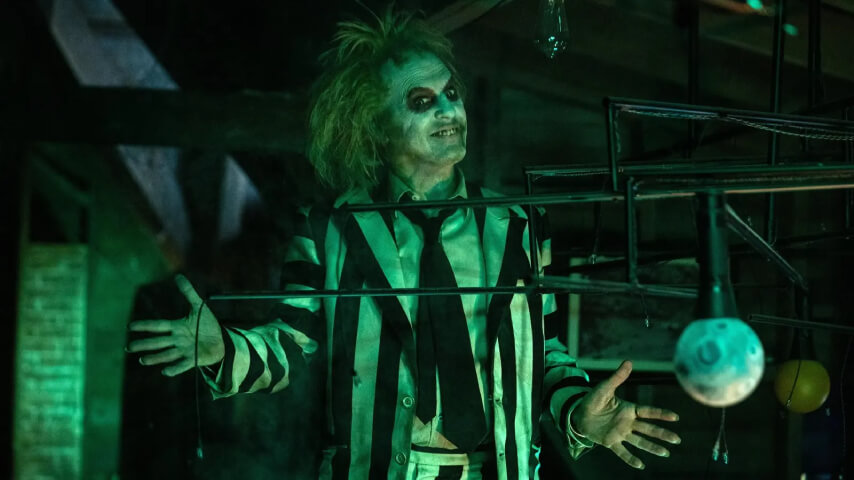Beetlejuice Beetlejuice reinvigorates Tim Burton’s stale brand, returning to practical playfulness
Tim Burton returns to the tangible strangeness of his early career with this long-coming sequel, aided by a game returning cast.
Photo: Warner Bros.
There’s a house, on a street, in a town, next to a river—or is it a model of a house, on a street, in a town, next to a river? Is this model a recreation of something real, or a ghostly apparition in itself? Are we driving down this street, suspended above a replica, or floating through something else altogether? These are the questions provoked in the opening moments of Tim Burton’s Beetlejuice and mirrored in the first scene of the sequel, Beetlejuice Beetlejuice. In both cases, Danny Elfman’s brassy score bellows as white picket fences blur past. Vintage shops fade into garages, which fade into churchyards; a quaint picture of America. Much like the 1988 movie, though, Beetlejuice Beetlejuice barely touches those early world-building questions. Instead, it is intent on toppling this suburban dreamscape to play among the beams of its rotted foundation.
Taking place 40 years after the original, Beetlejuice Beetlejuice picks up with an adult Lydia Deetz (Winona Ryder) who has now sold out, becoming a medium with a ghost hunting TV show. Her life is somewhat in shambles. Her daughter Astrid (new Tim Burton muse Jenna Ortega) barely speaks to her, and her greasy-haired boyfriend Rory (Justin Theroux, proving once again to be a comedic tour de force) obviously leeching off her fame and money. What’s more, Betelgeuse (Michael Keaton) seems to be haunting her, appearing in brief, unnerving flashes that only grow in intensity when Lydia learns of her father’s death.
There are side plots about Astrid falling for a local boy, and Wolf Jackson (Willem Dafoe), an actor turned underworld private detective who is hunting for the soul-sucking Delores (Monica Bellucci). None of these odds and ends make much sense, but all of Burton and screenwriters Miles Millar and Alfred Gough’s wacky ideas are captured beautifully by cinematographer Haris Zambarloukos, and choreographed to a set of new, off-kilter music numbers. It is obviously the most fun Burton and his collaborators have had in decades.
The whole returning cast is game, with Catherine O’Hara and Ryder lending their characters a world-weariness in the set of their shoulders and roll of their eyes. By comparison, Keaton is tasked with reverting back to the crude impishness and wide gait of his first turn (after all, there isn’t much personal growth once you’re dead). Ortega rounds out the ensemble, and while her delivery doesn’t quite revitalize the disenfranchised teen trope in the same way Ryder’s did in 1988, she teases a sweet earnestness from Ryder’s Lydia, who is intent on ensuring that her daughter doesn’t follow in her footsteps and fall for Betelgeuse’s elaborate tricks. It is this balance of actors (each of whom could lead their own version of this film) that makes for a thoroughly watchable version of the done-to-undeath legacy sequel. Their willingness coincides with Burton’s obvious exhaustion with his own “brand,” and his recommitment to the kind of goofy practicality that first drew him to moviemaking.
And when each of the characters descends into the hall of mirrors-esque Afterlife, through a series of increasingly absurd (and dark) hijinks, Burton’s playfulness is convincingly displayed. What follows is a mix of garish prosthetics (each of which highlight gory, creative ways to die), ‘80s needledrops (signifying Astrid’s alternative taste), and tangential stories that flourish into bite-sized pieces of homage (like those with complete Italian dubbing) or stop-motion animation. Beetlejuice Beetlejuice is just bold and brash enough to work, a formula perfected in Burton’s first decade of directing (and, considering his later work, seemingly forgotten until now).
Early on, Lydia poses the following, in a performative, overly enunciated cadence fit for her live TV audience: “The living and the dead: Can they coexist? That’s what we’re here to find out.” Perhaps unfairly, that’s what the audience is subconsciously reckoning with too. Can a beloved director both reconnect with his early craft and make something that feels embedded in this current moment? Timeless, but not nostalgic?
Beetlejuice Beetlejuice is strangely paced and barely comprehensible, plot-wise, but it is aesthetically esoteric in a way that used to be synonymous with Tim Burton’s filmmaking, alive and real. Midway through the film, Astrid’s love interest (Arthur Conti) says, “I don’t trust what I can’t touch.” With this tangible, invigorating sequel, it seems to be a mantra Burton is returning to. Like in the first Beetlejuice, there is a genuine enjoyment gleaned from spending time in a world built by such serious craftsmen to such playful ends.
Director: Tim Burton
Writers: Miles Millar, Alfred Gough
Cast: Michael Keaton, Winona Ryder, Catherine O’Hara, Justin Theroux, Jenna Ortega, Willem Dafoe, Monica Bellucci
Release Date: September 6, 2024
This review originally ran on August 28, 2024 as part of The A.V. Club‘s Venice Film Festival coverage.